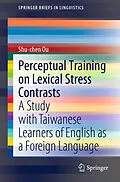This book presents the effects of perceptual training on the perception of English lexical stress in rising intonation by Mandarin-speaking EFL learners in Taiwan, and shows that these effects can be positive as well as negative. The book is of interest to researchers in lexical stress and intonation, or issues related to acquisition of L2 suprasegmentals and native-language impact on this process, as well as for those designing a training course on lexical stress for EFL learners, particularly those with a tone language background.
Inhalt
1. Introduction
1.1 Overview of this Book
1.2 Non-native Speech Perception: Theories and Models
1.3 Training for Improving Non-native Speech Perception
2. Perceptual Training: A Literature Review
2.1 Introduction
2.2 Perceptual Training: The Methodology and Design
2.3 Applications of Perceptual Training
2.2.1 Training Listeners to Perceive Non-native Segmental Contrasts
2.2.2 Training Listeners to Perceive Non-native Suprasegmental Contrasts
2.4 Factors Influencing Training Effects
2.5 Lexical Stress Perception and Stress Deafness
2.5.1 Perception of English Lexical Stress
2.5.2 Mandarin Listeners' Deafness to English Lexical Stress in RisingIntonation
2.6 Perceptual Training of the Current Study: The Goal and Design
3. Training to Perceive English Lexical Stress in Rising Intonation: The Immediate
Effects
3.1 Introduction
3.2 Materials
3.3 Acoustic Analysis
3.3.1 Falling Intonation
3.3.2 Rising Intonation
3.4 Training and Testing Procedures
3.4.1 Pre-test
3.4.2 Perceptual Training
3.4.3 Post-test
3.5 Participants
3.6 Response Accuracy Analysis
3.7 Results
3.7.1 Trainee Group
3.7.2 Control Group
3.8 Summary and Discussion
3.8.1 Enhanced Performance under the Rising Intonation Context
3.8.2 Reduced Performance under the Falling Intonation Context
3.9 Conclusion
4. Training to Perceive English Lexical Stress in Rising Intonation: Generalizability
and Retainability
4.1 Introduction
4.2 Materials
4.3 Acoustic Analysis
4.3.1 Falling Intonation
4.3.2 Rising Intonation4.4 Testing Procedures
4.4.1 Generalizability Test
4.4.2 Retainability Test
4.5 Participants
4.6 Response Accuracy Analysis
4.7 Results
4.8 Summary and Discussion
4.8.1 Generalizability of Training Effects
4.8.2 Retainability of Training Effects
4.9 Conclusion
5. General Discussion
References
Appendix A
Appendix B
Appendix C
Appendix D
Titel
Perceptual Training on Lexical Stress Contrasts
Untertitel
A Study with Taiwanese Learners of English as a Foreign Language
Autor
EAN
9783030511333
Format
E-Book (pdf)
Hersteller
Veröffentlichung
23.06.2020
Digitaler Kopierschutz
Wasserzeichen
Dateigrösse
3.3 MB
Anzahl Seiten
124
Unerwartete Verzögerung
Ups, ein Fehler ist aufgetreten. Bitte versuchen Sie es später noch einmal.
